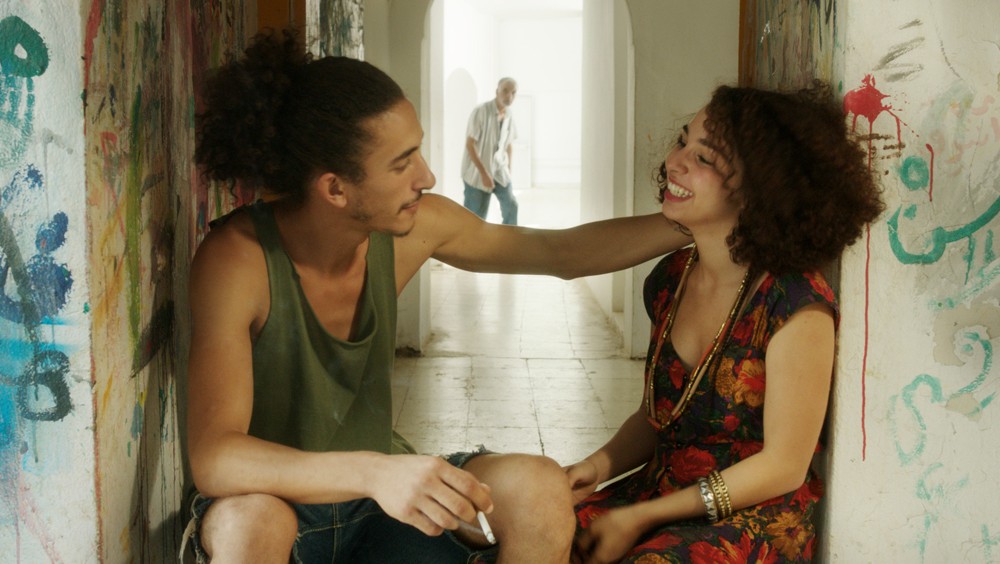Leyla Bouzid is a Tunisian born and raised filmmaker. She studied French literature at the University of Paris and film directing at La Fémis. Her shorts “Soubresauts” (2011) and “Zakaria” (2013) both won awards at the Festival Premiers Plans d’Angers. “As I Open My Eyes” (2015) is her first feature, which premiered in Venice Days and won the Muhr Fiction Feature award at the Dubai International Film Festival. (Press materials)
“As I Open My Eyes” will premiere at the 2016 Tribeca Film Festival on April 14.
W&H: Describe the film for us in your own words.
LB: Tunis, Tunisia, 2010: Farah plays rock music and wants to live an independent life. As a 18 year-old girl, her priorities are finding love and exploring her limits. We see her boundless energy undermined by the resistance of her family, society and the built in system of her country.
W&H: What drew you to this story?
LB: When the [Jasmine] Revolution happened, the desire to film and document that period was very strong. Many documentaries were shot then — all full of hope, all focused on the future.
I, too, really wanted to film. Not the revolution, but what everyone had lived through and been subjected to: the suffocating everyday life, the total power of the police, the surveillance, the fear and paranoia of the Tunisian people over the past 23 years.
W&H: What do you want people to think about when they are leaving the theater?
LB: I want them to feel close to Farah, the main character, or Hayet, her mother, or both. I want them to have the feeling that they shared a part of their life, to wonder what they would have done in the same situation and to keep on thinking about what will happen after the end of the film. I want them to better understand modern Arab youth who love life and are fighting for its continued existence.
I hope the viewer understands how close all human beings are.
W&H: What was the biggest challenge in making the film?
LB: The biggest challenge was producing and creating the original soundtrack of the film. The composer, Khyam Allami, made the rock music I dreamed of with the lute, inspired by traditional Tunisian music with Arabic lyrics. He composed the music for the main actress as well. I had to find a young girl able to sing and act!
I searched for real musicians that suited my characters. We formed the band and they practiced and they really played and sang while filming without any playback. It was like a real concert. Thinking about how to film the music and to record these live sessions was the biggest challenge and one of my proudest moments in the making of the film. The fact that now a CD of this music exists is just amazing.
W&H: How did you get your film funded? Share some insights into how you got the film made.
LB: The film was financed through several little funds from several countries. The main funding came from the Tunisian cultural ministry. We also received funding from the French and Belgium National Cinema Centers. We also got money from the “Arab Fund for Art and Culture” (AFAC), Vision Sud-Est (Switzerland) and Sanad (Abu Dhabi fund). It’s a long process of financing from several funds. I had the advantage of having a very proactive French producer, Sandra Da Fonsaca, and a very serious and efficient Tunisian producer, Imed Marzouk.
W&H: What’s the best and worst advice you’ve received?
LB: Best advice: Follow your instinct — no one knows the film better than you do.
Worst advice: It was so bad there’s no way for me to remember it!
W&H: What advice do you have for other female directors?
LB: Trust yourself and never give up.
W&H: Name your favorite woman-directed film and why.
“The Silences of the Palace,” directed by Moufida Tlatli (Tunisia). It’s her first feature film. It’s a beautiful and powerful mother-daughter portrait — very sensitive and sensual — dealing with a historical period. The way it’s filmed, the atmosphere and the lead actress are just amazing. It stars the beautiful Amel Lehdhili and a young Hind Sabri, who later became a star.







